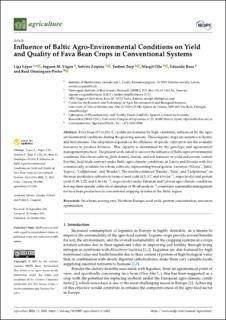Influence of Baltic Agro-Environmental Conditions on Yield and Quality of Fava Bean Crops in Conventional Systems
Lepse, Liga; Vågen, Ingunn Molund; Zeipina, Solvita; Torp, Torfinn; Olle, Margit; Rosa, Eduardo; Dominguez-Perles, Raul
Peer reviewed, Journal article
Published version
Permanent lenke
https://hdl.handle.net/11250/2839019Utgivelsesdato
2021-10-23Metadata
Vis full innførselSamlinger
Sammendrag
Fava bean (Vicia faba L.) yields are featured by high variability, influenced by the agro-environmental conditions during the growing seasons. These legume crops are sensitive to hydric and heat stresses. The adaptation depends on the efficiency of specific cultivars to use the available resources to produce biomass. This capacity is determined by the genotype and agronomical management practices. The present work aimed to uncover the influence of Baltic agro-environmental conditions (fava bean cultivar, plant density, climate, and soil features) on yield and protein content. For this, field trials were set under Baltic agro-climatic conditions, in Latvia and Estonia with five commercially available fava bean cultivars, representing broad genetic variation (‘Gloria’, ‘Julia’, ‘Jogeva’, ‘Lielplatones’, and ‘Bauska’). The results evidenced ‘Bauska’, ‘Julia’, and ‘Lielplatones’, as the most productive cultivars in terms of seed yield (4.5, 3.7, and 4.6 t ha−1, respectively) and protein yield (1.39, 1.22, and 1.36 t ha−1, respectively) under Estonian and Latvian agro-climatic conditions. Sowing these specific cultivars at densities of 30–40 seeds m−2 constitutes sustainable management for fava bean production in conventional cropping systems in the Baltic region.

